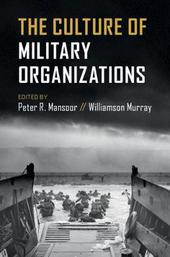
|
The Culture of Military Organizations
Paperback / softback
Main Details
| Title |
The Culture of Military Organizations
|
| Authors and Contributors |
Edited by Peter R. Mansoor
|
|
Edited by Williamson Murray
|
| Physical Properties |
| Format:Paperback / softback | | Pages:482 | | Dimensions(mm): Height 227,Width 152 |
|
| Category/Genre | Military history |
|---|
| ISBN/Barcode |
9781108724487
|
| Classifications | Dewey:306.2709 |
|---|
| Audience | | Professional & Vocational | |
|---|
| Illustrations |
Worked examples or Exercises; 3 Tables, black and white; 1 Line drawings, black and white
|
|
Publishing Details |
| Publisher |
Cambridge University Press
|
| Imprint |
Cambridge University Press
|
| Publication Date |
17 October 2019 |
| Publication Country |
United Kingdom
|
Description
Culture has an enormous influence on military organizations and their success or failure in war. Cultural biases often result in unstated assumptions that have a deep impact on the making of strategy, operational planning, doctrinal creation, and the organization and training of armed forces. Except in unique circumstances culture grows slowly, embedding so deeply that members often act unconsciously according to its dictates. Of all the factors that are involved in military effectiveness, culture is perhaps the most important. Yet, it also remains the most difficult to describe and understand, because it entails so many external factors that impinge, warp, and distort its formation and continuities. The sixteen case studies in this volume examine the culture of armies, navies, and air forces from the Civil War to the Iraq War and how and why culture affected their performance in the ultimate arbitration of war.
Author Biography
Peter R. Mansoor, Retired Colonel, US Army, is the General Raymond E. Mason, Jr Chair of Military History at The Ohio State University. He assumed this position after a twenty-six year career in the US Army that culminated in his service as the executive officer to General David Petraeus, commanding general of Multi-National Force-Iraq, during the surge of US forces in 2007 and 2008. Williamson Murray is a Professor Emeritus of history at the Ohio State University. His work over the past fifty years focuses primarily on grand strategy, operations, and airpower. He has published numerous highly acclaimed works, including The Change in the European Balance of Power, 1938-1939: The Path to Ruin (1984), Strategy for Defeat: The Luftwaffe (1986), German Military Effectiveness (1992), The Air War in the Persian Gulf (1995) and A War to Be Won: Fighting the Second World War, 1937-1945 (2000).
Reviews'The Culture of Military Organizations explains superbly the importance of military culture and clearly demonstrates how culture underpins the effectiveness of armed force. Culture, once formed, is difficult to change; it cannot always be 'tamed,' but it can and should be understood. This book makes an enormous contribution in helping to foster that understanding. The history is first-rate, the analysis incisive, and the conclusions of enormous value to military leaders and policy makers today.' General David Petraeus, US Army (Ret.), former commander of the surge in Iraq, US Central Command, and Coalition Forces in Afghanistan 'A brilliant set of analyses of military cultures that captures the nature of military culture and an understanding of its importance. This is an important work written at a time when military innovation and transformation are being hotly discussed and debated. This is a must read for all those military leaders attempting to develop organizations that can meet the challenges posed by a new and different security environment.' General Anthony C. Zinni, United States Marine Corps (Ret.) 'The old Druckerism that 'culture eats strategy for breakfast' is aptly demonstrated in this erudite yet accessible book. Murray and Mansoor reveal how military culture eats strategy, operational logic and sound tactics in every war. Students of military history will revel in its insights and professors will find it chocked with invaluable lessons for the classroom.' Colonel Frank Hoffman, United States Marine Corps (Ret.) 'Invaluable perspectives on what may be the most important determinant of victory or defeat in war. Students of warfare and those responsible for military effectiveness will find important insights that not only impart understanding, but also illuminate ways to accentuate positive elements of military culture or compensate for deficiencies.' H.R. McMaster, Stanford University 'The editors assembled a strong roster of contributors; there are no weak chapters as sometimes occurs in such works. Though the quality is uniformly good, the great strength of the cases is their diversity. There is a temporal balance with the late 19th, early and late 20th centuries represented in roughly equivalent parts.' Col. J.P. Clark, ARMY Magazine 'This volume makes a useful contribution to begin global historical explorations of military culture.' Thomas Furse, Journal of Contemporary History
|